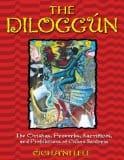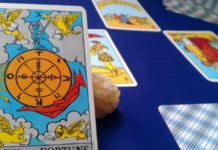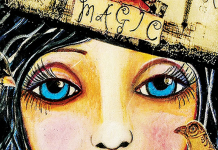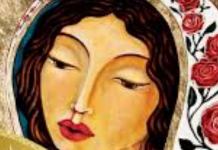
The Diloggun: The Orishas, Proverbs, Sacrifices, and Prohibitions of Cuban Santeria
, by Ocha’ni Lele (B. Stuart Myers)
Inner Traditions, 089281912X, 2003
The author of this book, Ocha’ni Lele, has been involved in the religion of Santeria since 1989, and has been a priest in that religion since 2000. He is a priest of Oya and brings his experiences over the past several years to bear on the topic of divination by this little understood system.
He does not equivocate or make excuses for the requirement for sacrifice. Many readers may be uncomfortable with these statements and feel that the religion is “too primitive” or “too brutal” to be considered a “real religion,” but that is, in my opinion, simply a result of the culture many of us have been raised in.
He is, by no means, the ultimate authority on the system of diloggun, as he is the first to admit. There are many more experienced diviners out there. What he is, is the first to write a book from the perspective of an actual user of the system for those who are not members of the system.
In this book, be continues the exploration of the divinatory systems of Santeria, adding a wealth of knowledge to an area which has, traditionally, been veiled in secrecy. While not everyone is happy to see this information becoming more readily available, no one can deny the importance of recording it. It has been passed down, orally and through handwritten libretas for centuries. It has now been accessible to the general populace.
He begins the book with a brief (eight page) “Introduction to the Lucumi Religion.” For those with no background knowledge of the faith, this is quite valuable. It agrees, in most particulars, with other accounts, although there are some areas which may be interpreted differently by other authors. Still, this is a succinct, readable condensation of several hundred years of evolution into a few pages.
At the end of this introduction, he agrees with some critics that his work should not (and cannot) take the place of personal instruction. That has never been his intention. In his previous offerings (The Secrets of Afro-Cuban Divination and Obi Oracle of Cuban Santeria both from Inner Traditions), he has stressed that his work is intended as a resource to be used in conjunction with the personal training and contact which is vital to the continuation of this religion.
Although not specifically stated as such, this current book is a continuation and expansion of the first-mentioned book. It contains a much fuller explanation and interpretation of the diloggun system of divination. It contains all the previously released information and a lot more. It is not a book to be approached lightly
He relates some of the oral history of the Lucumi in the late-19th and early-20th century Cuba. While it would be difficult, if not impossible, to verify much of this history, it does provide some much-needed grounding. While much of this information has been available to Santeras and Santeros, those coming to the faith will benefit from hearing this. The background given in this book is much more extensive than any I have ever seen before. The explanations given for the requisite behaviors are clear and concise.
If you wish to learn the basics of this system of divination, this book will give you all the basic information you need. HOWEVER, reading and using this book is not enough. In order to fulfill the requirements for many of the readings, it is necessary to have the proper connections with the Lucumi community, and that does not come out of a book.
The sheer amount of information contained within the covers of this book is astounding. I have never seen a book which explains this type of divination in anything like this amount of detail.
The size and price of this book will serve to discourage the casual browser, I am sure. It will, however, fill an important gap in the available information for the student of diloggun. While it cannot replace the personal instruction which is a vital component of that training, it can serve as an inspiration for the student.








